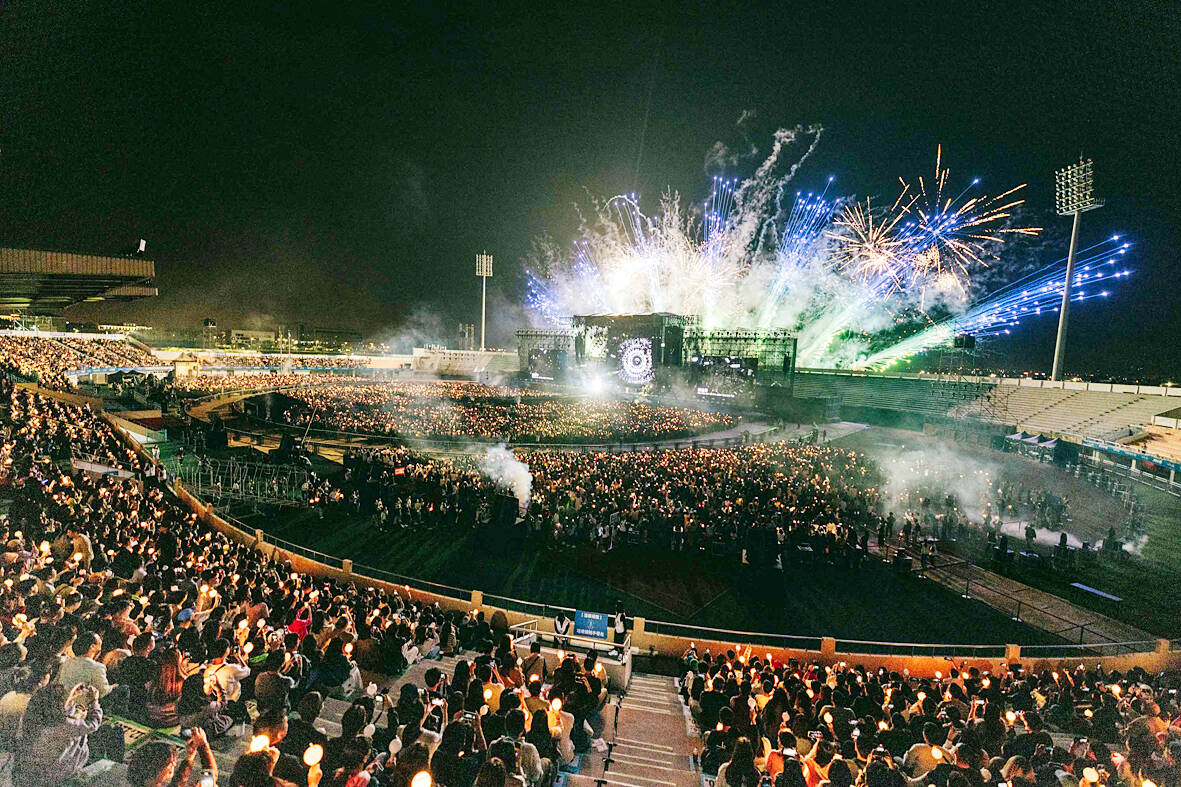Cases of ticket scalping for performances have decreased after the introduction of regulations in June last year, Deputy Minister of Culture Sue Wang (王時思) said yesterday.
Amendments to the Cultural and Creative Industry Development Act (文化創意產業發展法), which raised fines for scalpers, were passed in May last year and took effect the following month.
Under the amendments, people selling tickets to performances at inflated prices can be fined 10 to 50 times the original value of the scalped tickets, up to a maximum of NT$3 million (US$92,143), and sentenced to up to three years in jail.

Photo courtesy of B’in Music
Since the amendments were adopted, the number of scalping cases reported to the ministry and the difference between the resale and original price of tickets have decreased, Wang said at the Legislative Yuan in Taipei.
The issue gained national attention after an engineer was last week arrested for developing software to help people purchase tickets online quickly.
From June 2 last year to April 1, the ministry received 131 reports of scalping in which people used false information or other improper means, such as computer programs, to purchase tickets to performances, Wang said.
Eight cases have been filed for investigation, three were submitted to district prosecutors’ offices, two were dismissed and the remainder are under investigation, she said.
Over the period, 2,105 cases of scalping were reported, and 609 valid cases were handed over to local governments for investigation, Wang said.
Local governments have completed investigations into 300 cases, along with other independent cases that were not handed over by the ministry, she said.
Fines totaling NT$2,084,490 have been imposed in 30 cases, she said.
The ministry encourages ticketing platforms and the organizers of performances to use a real-name ticketing systems, which it subsidizes, Wang said.
Twenty events have received the subsidy so far this year, including concerts by Japanese pop duo Yoasobi, Japanese singer-songwriter Minami and South Korean singer-songwriter IU, she said.
To help local government officials better handle scalping cases, the ministry held a briefing session and three training sessions last year, and has held three training sessions in northern, central and southern Taiwan so far this year, Wang said.
Chinese Nationalist Party (KMT) Legislator Hung Meng-kai (洪孟楷) voiced concerns about the new tactics being used to resell tickets, such as giving them out as freebies with other goods.
In response, Wang said that the ministry would consult with relevant agencies and put forward guidelines regarding the issue within a month.

PRAISE: Japanese visitor Takashi Kubota said the Taiwanese temple architecture images showcased in the AI Art Gallery were the most impressive displays he saw Taiwan does not have an official pavilion at the World Expo in Osaka, Japan, because of its diplomatic predicament, but the government-backed Tech World pavilion is drawing interest with its unique recreations of works by Taiwanese artists. The pavilion features an artificial intelligence (AI)-based art gallery showcasing works of famous Taiwanese artists from the Japanese colonial period using innovative technologies. Among its main simulated displays are Eastern gouache paintings by Chen Chin (陳進), Lin Yu-shan (林玉山) and Kuo Hsueh-hu (郭雪湖), who were the three young Taiwanese painters selected for the East Asian Painting exhibition in 1927. Gouache is a water-based

Taiwan would welcome the return of Honduras as a diplomatic ally if its next president decides to make such a move, Minister of Foreign Affairs Lin Chia-lung (林佳龍) said yesterday. “Of course, we would welcome Honduras if they want to restore diplomatic ties with Taiwan after their elections,” Lin said at a meeting of the legislature’s Foreign Affairs and National Defense Committee, when asked to comment on statements made by two of the three Honduran presidential candidates during the presidential campaign in the Central American country. Taiwan is paying close attention to the region as a whole in the wake of a

A magnitude 4.1 earthquake struck eastern Taiwan's Hualien County at 2:23pm today, according to the Central Weather Administration (CWA). The epicenter of the temblor was 5.4 kilometers northeast of Hualien County Hall, at a depth of 34.9 km, according to the CWA. The earthquake's intensity, which gauges the actual effect of a temblor, was the highest in Hualien County, where it measured 2 on Taiwan's 7-tier intensity scale. The quake also measured an intensity of 1 in Yilan county, Taichung, Nantou County, Changhua County and Yunlin County, the CWA said. There were no immediate reports of damage or injuries.

OFF-TARGET: More than 30,000 participants were expected to take part in the Games next month, but only 6,550 foreign and 19,400 Taiwanese athletes have registered Taipei city councilors yesterday blasted the organizers of next month’s World Masters Games over sudden timetable and venue changes, which they said have caused thousands of participants to back out of the international sporting event, among other organizational issues. They also cited visa delays and political interference by China as reasons many foreign athletes are requesting refunds for the event, to be held from May 17 to 30. Jointly organized by the Taipei and New Taipei City governments, the games have been rocked by numerous controversies since preparations began in 2020. Taipei City Councilor Lin Yen-feng (林延鳳) said yesterday that new measures by